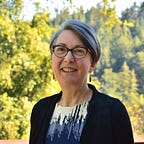Being there, when her mom couldn’t
Years ago, when it was looking like I might not be able to have a child of my own, a friend invited me to join her in volunteering as a Court Appointed Special Advocate (CASA). We went through training together and were each assigned a case, a child in the foster care system to mentor. My “advocate child” was a 15-year-old girl who reminded me of myself at that age — I’ll call her Chloe.
Chloe’s mother was my age. She lived with mental illness and addiction, and had lost custody of Chloe, her only child. Chloe had started using meth herself, and had stopped going to school. She was supposedly in a placement with a foster family, but they’d had a falling out and Chloe was sofa-surfing, staying with different relatives for a few weeks at a time.
I was Chloe’s advocate until she was 19, and I was supposed to be someone for her to look up to but honestly she inspired me. She was tiny, and tough. Chloe took hold of every opportunity within her reach and grasped onto it like a lifeline. I’ve never met anyone more determined to better her circumstances and make something of her life, and I felt honored to witness her do it. She successfully completed a group home program for youth with substance abuse issues. She moved back in with the foster family and returned to high school, where she was proud of making it onto the varsity cheer leading squad, and then walking the stage at graduation.
During the years I was Chloe’s advocate, I visited her every week. We spent a lot of time driving in my car, listening to her CD’s. We strolled around the mall and the beach boardwalk. We got manicures and ate junk food. I took her to a hair salon to get the elaborate up-do girls wore in those days for prom. One hot afternoon cruising along the freeway she said, “I know I haven’t said it, but, thank you for being here for me in the ways my mom can’t be right now.”
Part of an advocate’s commitment is to attend court hearings with the child. At one of those hearings, Chloe’s mom asked if she could be allowed to have unsupervised visits with Chloe. The judge asked Chloe what she thought –she was almost 18 then and was doing well, and the judge said she could decide. Chloe said, in a soft clear voice, that it was better to leave things as they were.
In that moment, waiting to hear what Chloe would say, I held my breath. When she answered, I let out a sigh. I felt for them both — Chloe and her mom — that they had to have that exchange on mic, in a courtroom full of strangers in suits.
After the hearing, Chloe’s social worker took her back to school. As I was walking to my car, Chloe’s mother stopped me and asked if I could drive her home. At first the silence in the car felt awkward, but then she turned to me and said, in almost the same words Chloe had used, “I want to thank you, for being there for Chloe when I wasn’t able to be.”
